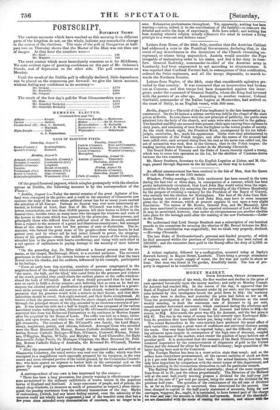Of the grand funereal pageant, which mingles grotesquely with the
election uproar at Dublin, the following account is by the correspondent of the Times- " Dublin, August 5.—Today the mortal remains of the great Agitator of Ire- land were consigned to the grave; and a vault in the cemetery of Glassnevin now encloses the body of the man whose political career has for so many years excited the attention of all Europe. Perhaps no funeral was over more numerously at- tended, in Ireland at least, than that of Mr. O'Connell was today; for, at the lowest computation, not less than 50,000 persons left their homes to follow in the funeral train, besides twice as many more who thronged the windows and roofs of the houses in the route which was pursued by the procession. Some persons, and principally those who differed from the political creed of the deceased, attended from a respect to the memory of a great and illustrious countryman; but amongst those of this class there were but few persons of note or distinction. The re- mainder, who formed the great mass of the people—those whose hearts he had gained over, and by whose aid he had raised himself to power, the stepping- stones of his greatness—these, the middle and lower classes of the Irish people, attended him to the grave with hearts overflowing, and vieing with each other in a sad species of enthusiasm in paying homage to the memory of their beloved leader.
"On the preceding day, Dr. Miley delivered a funeral sermon over the re- mains, at the chapel, Marlborough Street, to a crowded audience. The reverend gentleman in the coarse of his sermon became so intensely affected that the tears flowed down his cheeks, and his auditors, influenced by his example, participated in his feelings. "From an early hour this morning, numbers of persona congregated in the neighbourhood of the chapel which contained the remains; and amongst the rest, ' the maim, the halt, and the blind,' who cared little for the pressure and violence of the crowd, provided they could obtain the earliest glance at the coffin which en- closed the body of O'Connell. Most of them firmly persuaded that he had been sent on earth to fulfil a divine mission; and, believing that as soon as he had un- dergone the allotted period of purification in purgatory he is destined to a promi- nent niche among the saints and martyrs of their church, waited in confident ex- pectation that his presence would work a miracle in their favour, and that their infirmities should be cured, their sight restored, and their limbs straightened. At twelve o'clock the procession set forth from the above chapel, and thence proceeded through the principal streets of the city, attended by an immense concourse of peo- ple. It was about one mile and a half in length; and was composed of the various associated trades walking on foot, followed by Mr. O'Connell's triumphal car which conveyed him from the Richmond Penitentiary to his residence in Merrion Square after his acquittal by the House of Lords. 1 he coffin was laid on a large, rather plain, and open hearse, and which was itself covered with rich Genoa velvet and gilt ornaments. The members of Mr. O'Connell's own family, the Lord Mayor, clergy, magistracy, gentry, and citizens, followed. Amongst those who attended were the Most Reverend Dr. Murray, Roman Catholic Archbishop, and the fol- lowing Roman Catholic Bishops—M4Hale, O'Connor, Cantwell, Whelan, Nichol- son, O'Higgins, Magian, KNally, and Murphy; the Lord Chancellor, the Right Honourable Judge Perrin, Sir Montague Chapman, the Most Reverend Dr. Fold- ing, Roman Catholic Bishop of Australia, the Reverend Dr. O'Connell, Thomas Steele, &c. " After the procession had passed through the appointed route and arrived at Glassnevin Cemetery, the usual service was read over the coffin; which was then consigned to a magnificent vault especially prepared for its reception, in the very centre and most elevated portion of the burial-ground, by the Cemeteries Commit- tee; who have spared no expense to bestow both on the ceremonial and on the grave the most gorgeous appearance which the most liberal expenditure could present" A correspondent of our own is less impressed by the scene-
" There has been a long procession, but greatly wanting in effectiveness toper- sons accustomed to the ordinary exhibitions of trades unions in the populous towns of England and Scotland. A large concourse of people, and of pnests, the closed shop-windows, (a measure as much of precaution as respect,) alone distin- guiah the peaking movement from the ordinary transactions of the day. Marks of enthusiasm, (which, had any latent feeling existed, even the solemnity of the occasion could not wholly have suppressed,) and of the boastful mien that but a few years since attended every demonstration of numbers, are no longer to be
seen. Exhaustion predominates throughout. Yet, apparently, nothing has been wanting—unless, indeed, it be the contributions of the faithful—to reassure the deluded and revive the hope of expectancy. Bells have tolled ; and nothing has been wanting wherein religion usually influences the mind to restore a living principle to a worn-out and defunct cause."


























 Previous page
Previous page